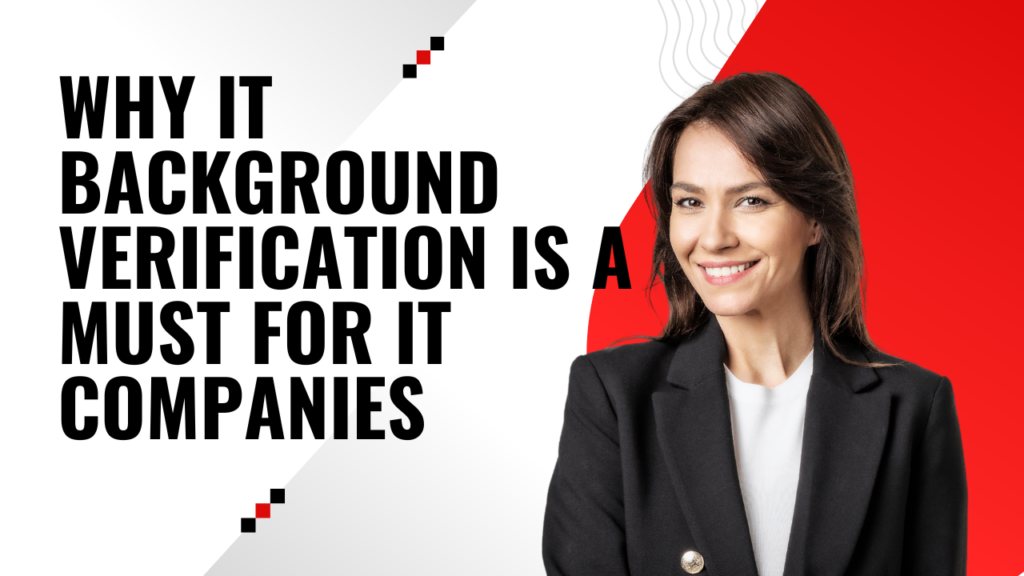The IT industry is one of the fastest-growing sectors worldwide, powering everything from banking and healthcare to e-commerce and government services. With this growth comes great responsibility—protecting sensitive data, maintaining trust, and ensuring compliance.
For IT companies, hiring the right talent is more than just about skills—it’s about trustworthiness, integrity, and reliability. This is why background verification has become an essential part of the hiring process.
🔹 1. Safeguarding Confidential Client Data
IT companies often deal with highly confidential information such as:
Financial transactions from banking clients
Health records for hospitals and insurance firms
Government data and defense projects
Proprietary software codes and algorithms
A single data leak can cost millions and permanently damage trust. Background verification ensures that employees with access to this data have no history of fraud, theft, or misuse.
🔹 2. Eliminating Fake Qualifications and Experience
With the demand for IT jobs skyrocketing, many candidates:
Exaggerate their experience in high-demand technologies (AI, Cloud, Cybersecurity)
Present fake certifications or manipulated degrees
Inflate salary history to negotiate higher pay
Background verification helps recruiters separate genuine professionals from fraudulent applicants. This ensures companies don’t waste time and resources training unqualified hires.
🔹 3. Reducing Insider Threats
While firewalls and cybersecurity tools protect against external attacks, insider threats are often overlooked. Studies show that nearly 30% of data breaches come from within an organization.
Background checks minimize risks by identifying individuals with:
Previous records of workplace misconduct
Criminal history related to fraud or theft
Suspicious financial activities that could lead to vulnerabilities
🔹 4. Compliance with Global Standards
IT companies working with international clients must comply with:
GDPR (Europe) – for personal data protection
HIPAA (USA) – for healthcare information security
ISO/IEC 27001 – for information security management
SOC 2 – for data security and privacy
Background verification ensures compliance by proving that employees handling sensitive projects are trustworthy and vetted.
🔹 5. Improving Workplace Culture
A healthy workplace environment drives innovation and productivity. By screening employees for integrity and professional behavior, IT companies can:
Avoid workplace harassment or misconduct cases
Maintain a respectful, collaborative culture
Reduce conflicts and employee turnover
When employees know their colleagues are verified, it creates a sense of safety and trust.
🔹 6. Protecting Brand Reputation
Reputation is everything in the IT industry. One wrong hire leading to:
A data breach
A fraud case
A compliance violation
…can take years to repair and result in client losses. A verified workforce demonstrates professionalism, helping companies win contracts and retain clients.
🔹 7. Saving Costs on Wrong Hires
Hiring mistakes are costly. Consider the expenses involved:
Recruitment advertising and HR time
Training programs and onboarding costs
Salary and benefits paid to an unfit employee
Cost of re-hiring and project delays
Background verification acts as a filter to avoid these financial losses.
🔹 8. Enhancing Client Trust and Partnerships
Global clients, especially in outsourcing, prefer IT companies that maintain strict employee verification policies.
It shows professionalism
It reassures clients about data safety
It helps build long-term partnerships
Verified employees = better client trust.
🔹 9. Detecting Criminal Backgrounds
Criminal record checks reveal whether a candidate has been involved in fraud, theft, cybercrime, or violence. Hiring without these checks can lead to:
Workplace safety risks
Legal liabilities
Loss of client confidence
For IT companies, where employees have access to critical digital infrastructure, criminal checks are a must.
🔹 10. Supporting Remote and Global Hiring
Remote work and global hiring are now standard in IT. With employees working from different cities or countries, background verification provides extra assurance. It helps companies confirm:
Authentic identity and address
Past employment across borders
Clean criminal and professional history
This builds confidence in a globally distributed team.
🔹 11. Reducing Employee Attrition
Background verification also checks for:
Stability in past employment
Frequency of job changes
Reliability in commitments
This helps companies identify employees who are likely to stay long-term, reducing attrition rates and ensuring project stability.
🔹 12. Competitive Advantage in the Market
Companies that enforce strict background checks stand out as secure, reliable, and professional. This becomes a unique selling point when bidding for large projects or government contracts.
✅ FAQs
1. Why is background verification critical in IT hiring?
Because IT employees handle sensitive data and core systems. Verification ensures trust, reduces fraud, and safeguards client relationships.
2. How long does IT background verification take?
Most checks (education, employment, criminal) take 3 to 7 business days, depending on the candidate’s history and country.
3. What if a candidate fails background verification?
If major discrepancies (fake degrees, criminal record) are found, companies usually withdraw the job offer or terminate employment.
4. Do small IT companies also need verification?
Yes. Even startups handle critical data. Background verification protects them from risks that could threaten their growth and survival.
For IT companies, background verification is not just a hiring step—it’s a business safeguard. It protects data, builds client trust, ensures compliance, and strengthens workplace culture.
In a world where one wrong hire can cost millions, verification isn’t optional—it’s essential.
